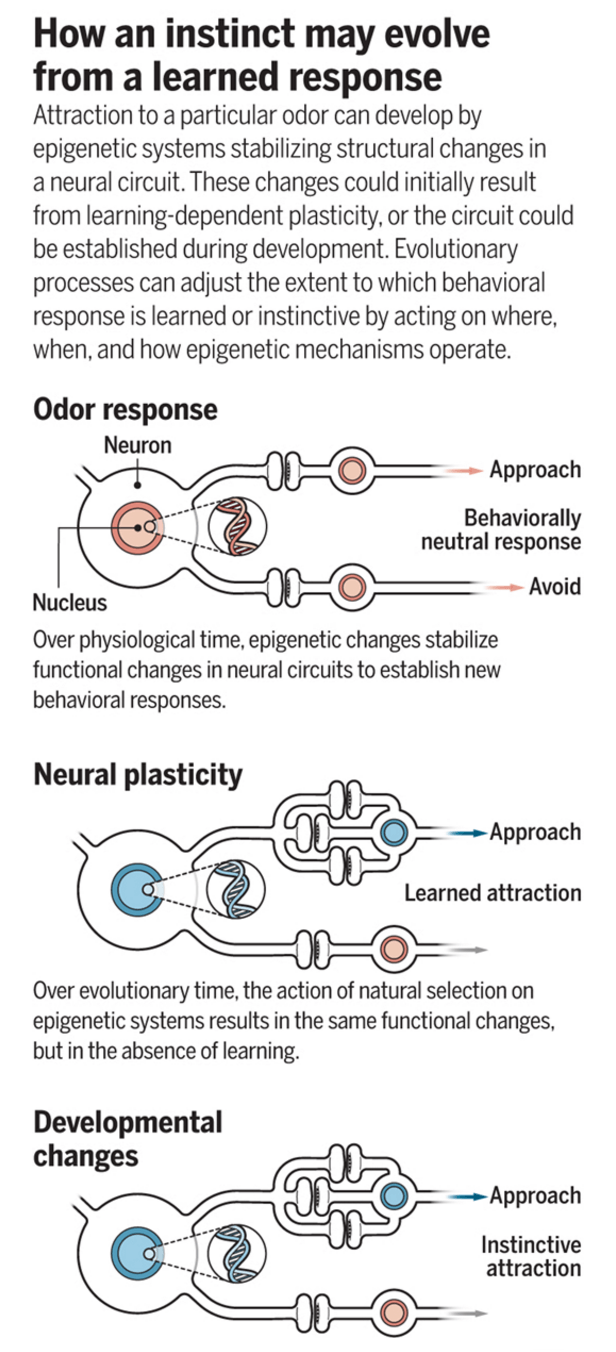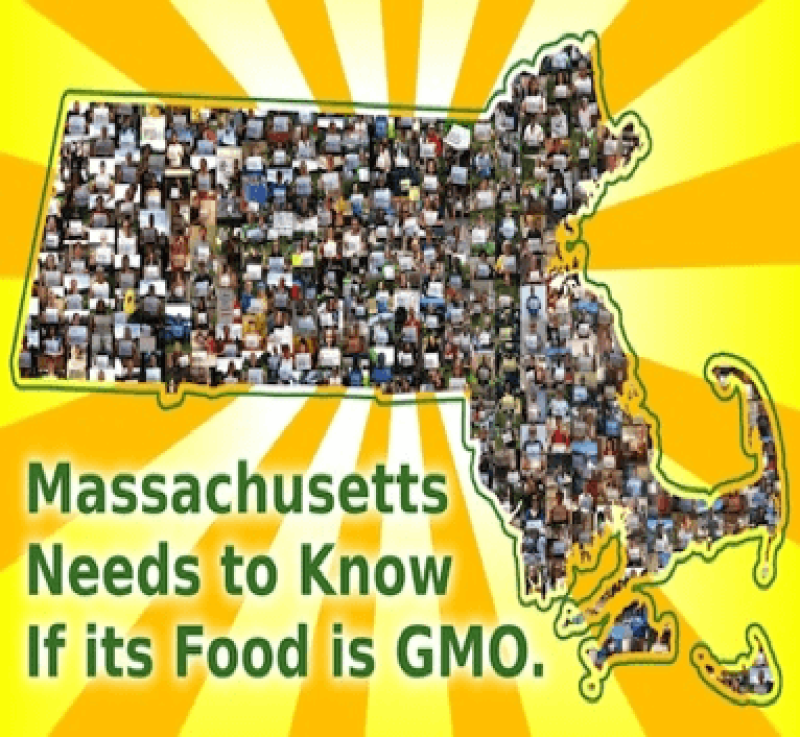This week’s features: A researcher’s decision to broadcast his controversial hypothesis about the evolution of instincts is irresponsible, and a study throws cold water on the idea of inherited trauma. Plus, see what’s trending on the Epigenetics Literacy Project.
If epigenetics can mediate a transgenerational inheritance of behavioral biases (either behaviorally mediated or by direct molecular actions), this would provide a mechanism for the rapid transformation of learned behavior to an instinct.
Gene Robinson and Andrew Barron
Evolution of instincts
Sea turtles instinctively know to crawl to the sea after they are born. Newborn dolphins immediately know how to swim. Animal instincts are as fascinating as they are mysterious. They appear to be hard coded into every member of a species but researchers have long struggled to figure out how these behaviors are inherited? This was the topic of an interview on a Canadian Public Radio show, Quirks and Quarks, which garners close to a million listeners around the world each week.
The interview was with Gene Robinson, an etymologist at University of Illinois at Urbana-Champaign, who works primarily with bees. He has been featured in numerous radio shows and once was on The Colbert Report. The discussion centered around his recent publication in Science, in which he discussed the evolution of instincts, claiming that epigenetic inheritance is instrumental to the process.
Gene RobinsonRobinson, and co-author Andrew Barron, a professor of biological sciences at the Macquarie University Sydney, Australia, subscribe to something called ‘behavioral plasticity’ which refers to a change in an organism’s behavior that results from exposure to changing environmental conditions. The theory is somewhat controversial as it is hard to prove that the behavior is not due to unknown genomic variance.
To be fair, they do not discount what they call the ‘mutation first’ model of evolution and they also believe both behavioral plasticity and genetic mutations are important. But they believe it is the former from which instincts might arise:
Tierney first proposed in 1986 that instincts can evolve from behavioral plasticity, but the hypothesis was not widely accepted, perhaps because there was no known mechanism. Now there is a mechanism, namely epigenetics. DNA methylation, histone modifications, and noncoding RNAs all exert profound effects on gene expression without changing DNA sequence. These mechanisms are critical for orchestrating nervous system development and enabling learning-related neural plasticity
 In some ways, Robinson and Barron are falling into a classic epigenetics pitfall. They think something is driving these changes at the molecular level, they don’t know what though–so they guess it’s epigenetics. As Sir Adrian Bird a geneticist at the University of Edinburgh famously said, “Epigenetics is a useful word if you don’t know what’s going on — if you do, you use something else.”
In some ways, Robinson and Barron are falling into a classic epigenetics pitfall. They think something is driving these changes at the molecular level, they don’t know what though–so they guess it’s epigenetics. As Sir Adrian Bird a geneticist at the University of Edinburgh famously said, “Epigenetics is a useful word if you don’t know what’s going on — if you do, you use something else.”
The paper describes some interesting research that they believe supports their idea. Epigenetic changes are undoubtedly important in learning and memory to stabilize regions of the genome an individual neuron needs. They also point to some of the research on rat licking and stress tolerance( if unfamiliar see this interactive from the University of Utah), which is the seminal work in the modern understanding of epigenetics. It also addresses gene expression changes that are closely linked with some evolutionary behaviors in bees, such as innate aggression.
But none of the work at present explains how epigenetic changes could be passed down for millennia as would be necessary to explain the aforementioned basic instincts they believe their theory explains. Nor do they discuss how these modifications would be maintained through the process of epigenetic reprogramming. Their concept jumps from “we see these cellular changes in learning and behavior” to maybe they explain evolutionary behaviors and instincts (what the author’s call ancestral memories) too.
From the paper:
Consider the question of the formation of an instinct in light of what we know about the formation of a memory. Learning involves experience-dependent strengthening of specific synapses. If learning is defined by the notion that neurons that “fire together, wire together”, how do instincts get wired during development in the absence of experience-dependent neuronal firing? In the case of human speech and hearing, neural development is shaped by experience in utero. Could epigenetic mechanisms that regulate changes in gene expression related to long-term memories play similar roles during development to form instincts?
Overall I have little problem with their idea. They even qualify it some by trying to make the case that epigenetic inheritance would help explain their theory, but isn’t necessary, “If epigenetics can mediate a transgenerational inheritance of behavioral biases (either behaviorally mediated or by direct molecular actions), this would provide a mechanism for the rapid transformation of learned behavior to an instinct. However, our hypothesis does not depend on such direct effects.” It even says ‘HYPOTHESIS’ right above the title on the paper’s link.
The publication is likely to stimulate a discussion among scientists on the relationship between learning, instincts and epigenetics. That’s a good thing.
But Robinson’s decision to go on public radio to explain his hypothesis–not a study with data just an idea– is irresponsible. Epigenetics is controversial and unsettled science. The public is confused about it. Even more controversial is the field’s relationship with evolution. Scientists need to be careful and conservative when engaging the public in discussions about epigenetics. Only robust findings should be covered for the public’s edification. Weak studies and general musings about the field should be ignored in popular media by journalists.
It’s just best that these preliminary discussions about ideas stay inside the pages of journals or at conferences.
Reversing inherited trauma
I’ve devoted a lot of space in the EATW blog to debunking the idea of inherited trauma (for example in the March 6 one about an article in Oprah’s magazine). Inherited trauma is the idea that a traumatic event in one’s life triggers an epigenetic change that is then passed on to the next generation (or generations) purportedly triggering some health malady (i.e. depression, poor stress tolerance, obesity). For the writer of the Oprah Magazine piece, Monique Barry, it was her anxiety which she says was the result of the stress her grandmother experienced from leaving her first husband. For others, like Glenn Forman who described his occupation as ‘life changer’, inherited trauma is a sales pitch.
The science of inherited trauma is controversial. It stems from the rodent studiesthat I linked to above, as well epidemiological ones. Not one study has described how the well-established process of epigenetic reprogramming–in which germ and embryonic cells lose all their methylation marks (the major epigenetic modification). The process of reprogramming happens twice in mammals. An alternative explanation is that any epigenetic changes that appear to be inherited are more likely a result of epigenetic changes that happen early in the embryo’s development, possibly due to an environmental exposure that is shared with parents.
A study out in the journal Neuropsychopharmacology seems to throw even more cold water on the idea of inherited trauma. Isabelle Mansuy, professor of neuroepigenetics at the University of Zurich, found that when the male rats were separated from their mothers they showed signs of trauma–as did their children. But when those same subjects encountered a positive environment, their trauma seemed to disappear:
And we show that the negative consequences of this which are depressive behaviors, cognitive problems, antisocial behaviors, risk-taking, this can be reversed if the father after being traumatized was exposed to a positive environment. So this reverses the symptoms and it also reverses the biological reasons, the biological cause for the symptoms in the progeny which are the epigenetic marks. Epigenetic marks can be corrected in sperm cells by this positive experience.
One of the main problems with making grand claims about the connection between epigenetics and health is the reversibility of epigenetic modifications. Now it appears that the changes associated with trauma are as well. If the marks can be easily reversed with a mere positive experience, they likely can’t cause the negative health effects decades down the road as so many, such as Foreman and Barry, claim.
Trending on the Epigenetics Literacy Project
Autistic brain has twice number of rare epigenetic modification, study finds
An understudied chemical modification that influences gene expression is abundant in the brains of people with autism, according to a new study1. The results are too preliminary to be conclusive, but they point to new avenues of study, experts say.
‘Epi-woo’: Hype surrounding epigenetics on social media can be ‘quite dangerous’
In the past, we had ‘quantum woo‘; now we seem to have epi-woo. As James Watson once said in rather blunt terms, “epigenetics is used for a lot of crap”. On Twitter, several accounts have popped up, such as @EpigeneticsBs to point it out. Its mission is to make epigenetic ‘bullshit’ public.
Our microbiome: Separating hype from health
The public is attempting to translate conflicting information about their microbiome (the bacteria that live in and on them) into their daily lives but the evidence isn’t in. Although we’ve known about the human microbiome for more than a century, research on the topic has exploded in just the last few years.
For more epigenetics news—as well as news about the microbiome and endocrine disruptors—check out the Epigenetics Literacy Project, a sister-site to the GLP. Follow us on Twitter and like our Facebook page.
Nicholas Staropoli is the director of the Epigenetics Literacy Project. He has an M.A. in biology from DePaul University and a B.S. in biomedical sciences from Marist College. Follow him on Twitter @NickfrmBoston
For more background on the Genetic Literacy Project, read GLP on Wikipedia































